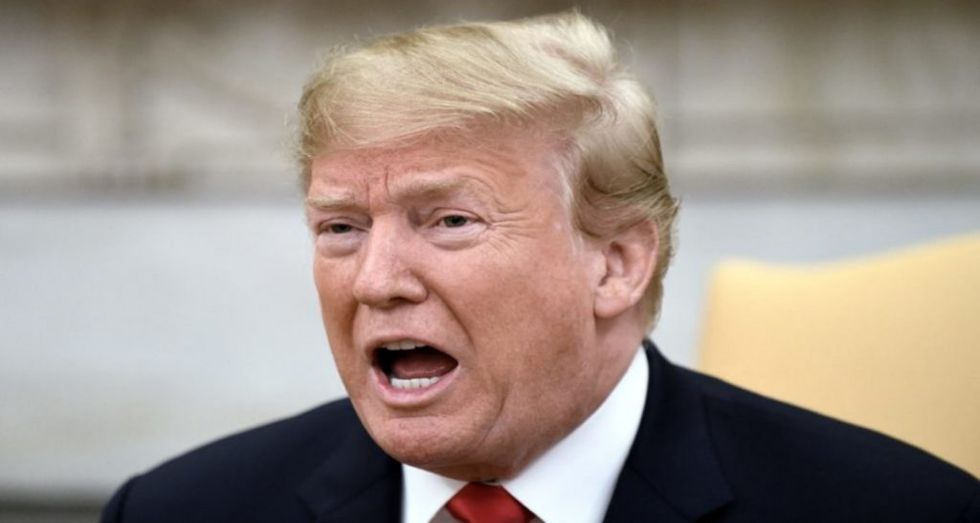The term fourth estate derives from the traditional European concept of the three estates of society: the clergy, the nobility, and the commoners. The free press, often referred to as the voice of the people, is the fourth estate of society. Unlike the common people of the world, the press can regularly ask direct questions of those in power.
But for the first time in the United States since McCarthyism, those in power openly target the free press. On a regular basis, the President and members of the Trump Administration attack the constitutionally guaranteed First Amendment right of United States citizens.
Now, Trump refers to any press organization that fails to only praise him as the "enemies of the people." Since his attacks against the press and on the First Amendment escalated, the news media is responding directly to the onslaught with a series of independent editorials from about 350 different newspapers around the United States.
The Chicago Tribune decided to join their fellow members of the free press by printing their own editorial prepared by not one or two of their columnists, but the entire Chicago Tribune editorial review board. This is significant as the newspaper's full editorial staff covers the entire spectrum of political leanings from very conservative to extremely progressive.
In that Chicago Tribune united effort they stated:
You may have read that, this week, scores of U.S. newspapers are responding in independently written editorials to President Trump’s many attacks on journalists as enemies — his word — of the American people."
"As this became a national news story, we at the Tribune Editorial Board had two choices: We could stay silent and leave you wondering what message to read into that, or we could explain in our own words the dangers the president’s incitement has created."
"We chose Option 2 even though we generally avoid group editorial efforts."
"We haven’t written at length about Trump’s vilification of journalists," The Chicago Tribune's editorial continued. "Journalism isn’t supposed to be about journalists. But Trump has made us part of news stories so often that we’ll take time to talk with you about that."
Nineteen months ago, Donald Trump swore an oath to defend the U.S. Constitution. One protection in its First Amendment is the stated guarantee of a press free from government dictates, and an implied responsibility for journalists to be a check on that government’s enormous powers."
"Rather than defending or at least respecting that guarantee and that responsibility, Trump has escalated from criticism to incitement: At public appearances he demonizes the reporters who cover his speeches and his crowds."
A concern for the safety of the press while in their offices and while reporting directly at events became very real when CNN reporter Jim Acosta was confronted while covering another Trump rally where the President railed against the press as shown in the following coverage.
During the 2016 presidential campaign, Donald Trump began to call press organizations that uncovered any uncomfortable truths about him "fake news." His followers took up the chant as well, regardless of the truth being reported. Since being elected, the President's attacks on the press have only escalated.
There is a growing fear that Trump rhetoric fueled attacks against the press will inevitably turn violent.
The Tribune editorial continued, stating:
He routinely insists that journalists intentionally craft false reports. As he put it in a July speech to a Veterans of Foreign Wars convention in Kansas City, 'Don’t believe the crap you see from these people, the fake news. Just remember — what you’re seeing and what you’re reading is not what’s happening'."
...Trump’s rants pose a much different, more dangerous threat. He is toying with the power of the presidency in order to provoke one part of the American public against another. At some point such verbal assault encourages ideological extremists to take action."
"It threatens journalists’ personal safety," the editorial explains. "And it undercuts that responsibility for a press that’s supposedly free of government control to act as a watchdog on public officials."
"The Tribune Editorial Board faulted Trump as a candidate," the Tribune acknowledged, "then as a president, for his boorish behavior and divisive language. His attacks on journalists exemplify his tendency to bully and humiliate."
There’s a direct line between his reluctance to shame white supremacists, his insertion of himself into other people’s disputes (the national anthem at football games?) and his relentless attacks on the press: His primary concern is his own popularity, his control of the moment."
"In sum: We aren’t the reflexive resistance Trump evidently imagines when he hears the word 'journalists.' We aren’t enemies of the American people. But many of us have fielded enough angry threats — in the streets, on our phones and at our computers — to chafe when a president calls us that."
That’s why we’re adding our voices to those of other journalists nationwide. Our role is to serve as a check on government. The president ought to get used to it."
















 @JaJa_no_NO/X
@JaJa_no_NO/X @CWMorgan1000/X
@CWMorgan1000/X reply to @spain2323/Instagram
reply to @spain2323/Instagram reply to @spain2323/Instagram
reply to @spain2323/Instagram reply to @spain2323/Instagram
reply to @spain2323/Instagram reply to @spain2323/Instagram
reply to @spain2323/Instagram reply to @spain2323/Instagram
reply to @spain2323/Instagram reply to @spain2323/Instagram
reply to @spain2323/Instagram reply to @spain2323/Instagram
reply to @spain2323/Instagram reply to @spain2323/Instagram
reply to @spain2323/Instagram reply to @spain2323/Instagram
reply to @spain2323/Instagram reply to @spain2323/Instagram
reply to @spain2323/Instagram reply to @spain2323/Instagram
reply to @spain2323/Instagram reply to @spain2323/Instagram
reply to @spain2323/Instagram reply to @spain2323/Instagram
reply to @spain2323/Instagram reply to @spain2323/Instagram
reply to @spain2323/Instagram reply to @spain2323/Instagram
reply to @spain2323/Instagram reply to @spain2323/Instagram
reply to @spain2323/Instagram